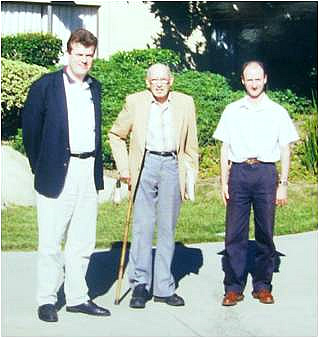Does the name “Peter Drucker” mean anything to you? If it does, you’ll be keen to read about my encounter with him back in the late 90s. If you haven’t heard of him, then read on anyway as you might just pick up some useful information.
Peter Drucker, (who died in 2005 at the ripe old age of 95) is widely considered to be the “father of modern management”. He was a renowned business thinker who predicted many of the major developments of the late twentieth century, including privatization and decentralization; the rise of Japan to economic world power, the decisive importance of marketing and the emergence of the information society.
He worked for and consulted for some of the top global companies, governments and non-profit organisations. After years of practicing, and refining his business thinking, Drucker developed key tools top management will benefit from, if used.
Back to my meeting with him. I was working for Lucas Industries in 1998 when I was given the task of predicting the long term future to understand the impact on the automotive industry for strategic planning purposes. Our CEO, Victor Rice, suggested that we seek Peter Drucker’s help because he was the only person he knew that consistently got it right.

Armed with some of his books, a team of three of us headed out to Claremont, California to meet with the man himself, for 3 days! (Not an inexpensive trip I can assure you).
It’s quite awesome talking to a man who says things like: “I remember when Harry told me to sort out the Japanese economy after the Second World War”. All matter of fact and never sounding like a boast.
In that time we covered many topics and he imparted many pearls of wisdom on the subject of scenario planning. One I want to leave you with is:
“You can’t predict the future but you can have a good guess about certain factors that affect your business such as demographics. Try and separate out what’s predictable from what’s not predictable. Unique statistical events such as the 1970s Oil Crisis or the assassination of Archduke Ferdinand could never be predicted.
However, an understanding of your business reveals key factors which are important for success. They could be raw material costs, sales volume or whatever. Try and anticipate what events could happen that would affect these key business factors and then train your early warning radar for looking for these types of events. Better still, group these events into scenarios and then prepare and rehearse your response for each scenario. By using this method, Shell Oil was much better prepared for the oil crisis of 1973“.
Interestingly, the automotive industry is very dependent on sales volume. The mantra for the last 30 years has been – reduce prices and then wait for increased volumes to make production viable again. So far this has worked, and volumes have sharply leapt in response to unique events and demographics. For instance: the Second World War trained many women to drive which paved the way for two-car families afterwards.
Volumes steadily rose throughout the 20th century, but what will happen next? Priorities have changed, car adoption is widespread and now the focus is on Green Issues. The industry is geared on ever increasing volumes, if volumes no longer grow, then disaster.
With this in mind: should we be baling out the unsustainable or instead looking for a better substitute industry?
Whether you followed Peter Drucker’s wisdom or another business mentor, there’s plenty to learn from listening to others!